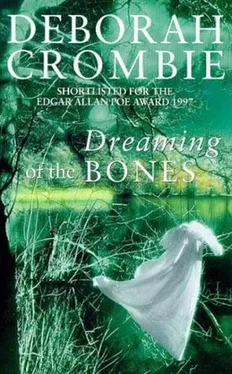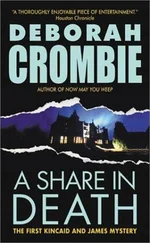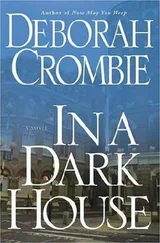Deborah Crombie - Dreaming of the bones
Здесь есть возможность читать онлайн «Deborah Crombie - Dreaming of the bones» весь текст электронной книги совершенно бесплатно (целиком полную версию без сокращений). В некоторых случаях можно слушать аудио, скачать через торрент в формате fb2 и присутствует краткое содержание. Жанр: Детектив, на английском языке. Описание произведения, (предисловие) а так же отзывы посетителей доступны на портале библиотеки ЛибКат.
- Название:Dreaming of the bones
- Автор:
- Жанр:
- Год:неизвестен
- ISBN:нет данных
- Рейтинг книги:3 / 5. Голосов: 1
-
Избранное:Добавить в избранное
- Отзывы:
-
Ваша оценка:
- 60
- 1
- 2
- 3
- 4
- 5
Dreaming of the bones: краткое содержание, описание и аннотация
Предлагаем к чтению аннотацию, описание, краткое содержание или предисловие (зависит от того, что написал сам автор книги «Dreaming of the bones»). Если вы не нашли необходимую информацию о книге — напишите в комментариях, мы постараемся отыскать её.
Edgar Awards (nominee)
Macavity Awards
Dr Victoria McClellan is writing a biography of the tortured poet Lydia Brooke, five years after Brooke's tragic suicide. Victoria becomes immersed in Lydia's life – she cannot believe the poet died by her own hand. So she calls her SI ex-husband for help in the case who receives terrible news…
Dreaming of the bones — читать онлайн бесплатно полную книгу (весь текст) целиком
Ниже представлен текст книги, разбитый по страницам. Система сохранения места последней прочитанной страницы, позволяет с удобством читать онлайн бесплатно книгу «Dreaming of the bones», без необходимости каждый раз заново искать на чём Вы остановились. Поставьте закладку, и сможете в любой момент перейти на страницу, на которой закончили чтение.
Интервал:
Закладка:
Your Lydia
CHAPTER 7
Tenderly, day that I have loved, I close your eyes,
And smooth your quiet brow, and fold your thin
dead hands.
RUPERT BROOKE,
from “Day That I Have Loved”
Vic often thought that this was her favorite time, Kit asleep, the house still and quiet except for the occasional creak as it breathed. She sat at the kitchen table with a cup of milk hot from the microwave, for once neither reading nor writing, but simply thinking about her day. This was a habit begun in the last years with Ian as a way of avoiding bed until she knew he was asleep, and now enjoyed for its own sake.
They’d never had the money to do the kitchen up properly, so she’d got creative with paint and jumble sale finds, discovering an unexpected sense of pleasure in the process. Blue on the cabinets, sunflower yellow on the rough plaster walls, junk shop jugs and pitchers on the worktops and windowsill. The Welsh dresser with its blue-and-yellow Italian pottery she’d found for a song at an estate sale, along with the small oak, drop-leaf table and her Tiffany lamp. At least she always thought of it as her Tiffany lamp-it was probably a cheap imitation, but she meant to have it valued some day, just in case.
Her mother, whenever she came to visit, threw up her hands in despair at the sight of Vic’s kitchen. A proponent of hygienic, synthetic surfaces, with a fetish for appliances (her latest acquisition was a rubbish compactor), Eugenia Potts had no patience with her daughter’s contentment. It was a good thing, thought Vic, that she didn’t really want a dishwasher or a refrigerator the size of cave, because without Ian’s salary the possibility of refitting had receded further than ever.
For a moment, she allowed herself the luxury of wondering what her life would have been like if she’d stayed with Duncan. Would they live in the flat he’d described in Hampstead, with its sunset view over the rooftops? Would she be teaching at London University, in a department less difficult? Would she and Duncan have ironed out their differences, she growing less jealous of his work as she became more absorbed in her own?
The one thing she felt quite certain of was that she wouldn’t have begun a biography of Lydia Brooke, and she was beginning to think that might have been a blessing.
Even after so many years apart, it had felt quite odd today to see him with another woman. She hadn’t felt jealous-she had, in fact, found herself unexpectedly drawn to Gemma-but she had experienced a sense of displacement.
Just how honest had she been with herself about her reasons for contacting him? Oh, she’d had legitimate need, and he had been helpful, but now that he’d done as much as he felt he could in the matter of Lydia, she found herself wanting very much to maintain the friendship, for Kit’s sake as well as her own. Kit had few enough male role models, and it was especially important now that Ian-
The phone rang. She lunged for it instinctively, hoping it hadn’t waked Kit. Even as she lifted the handset from the cradle, she knew who it was.
“Vic? I hope it’s not too late, but I managed to get away from the conference a day early.”
“No, it’s all right. I’m still up,” she said, her breathing quickening at the sound of Nathan’s voice.
“It was a bloody weekend, I can tell you,” he said, and she could imagine him smiling. He’d gone unenthusiastically on Friday to a botanists’ meeting in Manchester, mumbling that they could hardly have picked anywhere less appropriate.
She hadn’t often talked to him on the telephone, and she thought how much she liked his voice, deep, with laughter resonating under the surface. She’d always been a sucker for voices, Duncan’s, too, with its hint of Cheshire drawl, blunted now by so many years in London.
“Come round and I’ll tell you about it,” Nathan urged.
Hesitating, Vic felt the anxious knot of dread forming in her stomach. Did she want to confront him tonight? No point putting it off, she thought, and took a deep breath.
“Yes, all right. I suppose I can come over for a bit.”
“Come the front way. The garden’s a bog.” He added, teasing, “I don’t think the neighbors will see you this time of night.” The phone clicked, then the dial tone buzzed in her ear.
He still wore his jacket and tie, though he’d undone his collar button and pulled the knot of his tie down to a rakish angle. “I’ve got the fire going,” he said, ushering her into the hall. “Let me get you a drink.”
She shook her head. “Not just now.” The door to the music room stood open and the lamp on the piano was lit. “You’ve been playing,” she said, wandering in and touching the sheet music open on the stand. It was handwritten, and she recognized Nathan’s strong, black script.
“Just doodling while I waited for you.” He stood in the doorway, looking perplexed.
Vic slid onto the piano bench and stared at the keyboard. After a moment, she began to pick out a hesitant, childish version of “Chopsticks,” all she remembered from the brief lessons forced on her by her mother. Her rebellion had taken the form of stoic silence coupled with an adherence to the exact number of minutes she was required to practice. After a few months, her mother had given up in defeat. Vic was not musically gifted.
Ballet had been next. She should have stuck with piano.
“Didn’t you tell me that you were writing music based on DNA sequences?” she asked. “Is that what this is?”
“In part. It’s an idea mentioned briefly in a lecture by Leonard Bernstein, and I’ve always been fascinated by it. An innate universal musical language.” He left his position by the door frame and came towards her. “Vic, I happen to know that your interest in the mechanics of music lies somewhere on a par with your interest in particle physics. And you haven’t once looked at me since you came in. What is the matter? Has something happened?”
She turned towards him. “Nathan, why didn’t you tell me that you found Lydia?”
He stared at her. “It never occurred to me. I suppose if I’d thought about it, I’d have assumed you knew.”
“No. I’d no idea until I saw a copy of the police report today.”
“Does it matter?” he asked, sounding baffled. “Did you think I was deliberately keeping something from you?”
“No, not really,” she said, not willing to admit what she had thought in the face of his matter-of-factness. “It’s just that everything surrounding Lydia’s death seems so elusive.” She shivered with a sudden chill.
“It’s cold in here. Come in by the fire,” Nathan said with instant concern, and this time she followed him obediently.
“Why didn’t you ask me?” he said when he’d settled her in the armchair nearest the heat. “I’d have told you anything you wanted to know.”
“I didn’t know to ask. And even now I feel uncomfortable, because I’m afraid talking about it might distress you.”
“Ah.” Nathan sat across from her and took a sip of a drink he’d apparently made while waiting. “It was very distressing, actually, at the time,” he said slowly. “And I didn’t speak about it to anyone except the police, but I’d always assumed it had got about somehow, as everyone seemed to avoid the subject so assiduously.
“But it’s been a long time, and I don’t mind talking about it now, if you like.”
A simple explanation after all, thought Vic, and she had worked herself into a lather over it. Was she becoming paranoid, imagining conspiracies, and suspecting Nathan, of all people? Collecting herself, she said, “The police seemed to think that Lydia asked you to come that evening because she wanted you to find her.”
Читать дальшеИнтервал:
Закладка:
Похожие книги на «Dreaming of the bones»
Представляем Вашему вниманию похожие книги на «Dreaming of the bones» списком для выбора. Мы отобрали схожую по названию и смыслу литературу в надежде предоставить читателям больше вариантов отыскать новые, интересные, ещё непрочитанные произведения.
Обсуждение, отзывы о книге «Dreaming of the bones» и просто собственные мнения читателей. Оставьте ваши комментарии, напишите, что Вы думаете о произведении, его смысле или главных героях. Укажите что конкретно понравилось, а что нет, и почему Вы так считаете.












